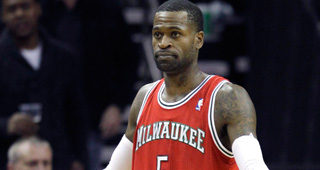Despite the Stephen Jackson for Richard Jefferson and a first round pick trade consisting entirely of assets moving between two teams, the nature of the players involved necessitates analyzing the trade for each team separately.
As far as the Spurs are concerned, one way of imagining this trade is that they sold their 2012 first round pick for Richard Jefferson’s $11+ million in 2013-14, since those stand as the biggest components of the deal. Even on that level of analysis, the Spurs did a very good job. Since Tim Duncan’s contract expires this summer and Manu’s expires in 2013, sliding the small froward expenditure from 2014 to 2013 gives the Spurs a more aligned timeframe to restructure should that be what they want to do moving forward. While the Spurs do an excellent job in the draft and can always use cheap talent, the dramatic increase in flexibility makes this component a favorable move for them.
Beyond that, the other key factor has to be the difference between Jackson and Jefferson over the lives of their current contracts. If any coach alive was going to rejuvenate Jackson, it must be Gregg Popovich. Jackson has already had success with San Antonio in this system, though his role will likely be different than it was when he was a very young player in 2003. Considering how poorly Jefferson has played this season, it seems unlikely he could be substantially worse other than some potential chemistry issues. If that comes up, the Spurs have the leadership to either put him in his place or simply cut him- it’s a benefit to having the other pieces San Antonio brings.
One other factor to consider is that this opens up San Antonio’s amnesty either this coming offseason or some other year. This comes in as both an advantage since they can use it on someone else and a disadvantage because having Amnesty 2.0 available could have given the Spurs’ front office the same salary cap flexibility Jackson’s expiring deal provided (as long as ownership was willing to foot that bill). Considering the general lack of other candidates for amnesty in the Spurs, this factor actually runs somewhat against them.
Spurs grade: A-
Golden State basically spent $11 million to pick up a first-round pick in 2012. While this is an excellent draft to pick up a late first rounder, it stands as a costly amount to pay because of the financial flexibility it costs them in the 2013 offseason. Under their previous salary alignment, the Warriors looked to have a small but non-trivial amount of room in 2013 partially thanks to the difference between Stephen Curry’s cap hold and what he will end up being paid (that buffer and a smidge of cap space creating a place, like Brook Lopez in New Jersey this summer). While it was probably unlikely that the team would get anything other than a low rotation player, the flexibility could have helped in other ways. Once Jackson becomes an expiring contract, he would have value if the Warriors were willing to add an additional year of salary like they did in this deal. Since Jefferson and Andris Biedrins expire in the same season, it seems unlikely that the team would do a similar move one year later and sacrifice a more potent amount of cap space.
The Warriors did avoid a pretty decent downside risk of having Jackson in this locker room, yet the only real upside of a Jefferson for Jackson swap with the Warriors’ current personnel is that reduction in downside. It is unlikely that Jefferson’s on-court contribution outpaces Jackson’s, if at all.
Golden State fans should be encouraged by ownership’s willingness to throw money around to get assets, though they certainly could have done so with a stronger positive impact in a different deal.
Warriors grade: C-



